Study (a Mandela affected bible) to Show Thyself Approved?
Written by Makingspace on .
With lines in the sand drawn, the Bible Changes Community has proven to be just as divided as other Christian communities are over what role the bible plays in our faith walk. Is this simply a typical expectation, or is that old serpent up to something?
The Bible Changes Community has grown heterogeneously, spawning various subgroups that express a host of conflicting attitudes and opinions about the bible. The views vary in everything from differing interpretations of what the supernaturally changing bible means to the impacts the changed bible has or does not have on eschatology. In spite of the changes happening, what seems to have risen to the surface in the diversity of these groups are certain bible verses that either do or do not relate to the Mandela Effect, but which guide respective ideas on Spiritual understanding and eschatology. For example, some argue that 2 Thessalonians 2 indicates that we are living in the time of the “lying signs and wonders” [NOTE: the KJV now says “lying wonders and signs] and therefore this serves as evidence that we are already in the tribulation.
" And then shall that Wicked be revealed, whom the Lord shall consume with the spirit of his mouth, and shall destroy with the brightness of his coming: Even him, whose coming is after the working of Satan with all power and signs and lying wonders,"
Others say Amos 8:11, where the prophet speaks of the famine of the hearing the words of the Lord, indicates that the Mandela Effect was prophesied in the passage which substantiates the claim to be experiencing the bible changes. Others give less credence to roll the bible changes have in prophecy and instead focus on passages in Revelations that mention things like, “circle of the earth”, “pharmakea” and the “mark of the beast”. The common understanding in our community, however; is that many of the “seeing” Believers consistently abide by a well-known passage from 2 Timothy as the impetus to pursue diligent scriptural study and discourse.
"Study to shew thyself approved unto God, a workman that needeth not to be ashamed, rightly dividing the word of truth."

Study to show thyself approved! This bible verse is the focus here as it really does set the parameters on the biblical stewardship of many whether they see the changes or not.
This passage is actually commonly referred to in MANY Christian community truth networks beyond the bible changes circles. The verse is often cited as the prelude to long and didactic if not theoretical forays into biblical prophecy and exegesis. The verse conjures images of a man diligently STUDYING so that his biblical knowledge garners the approval of his Master, and that he is not frowned upon for a lackluster attempt of his studious habbits. The KJV does quite a good job making this illustration. However, when you look at the broader family of bible translations, very few of the more established ones convey this same meaning and imagery.
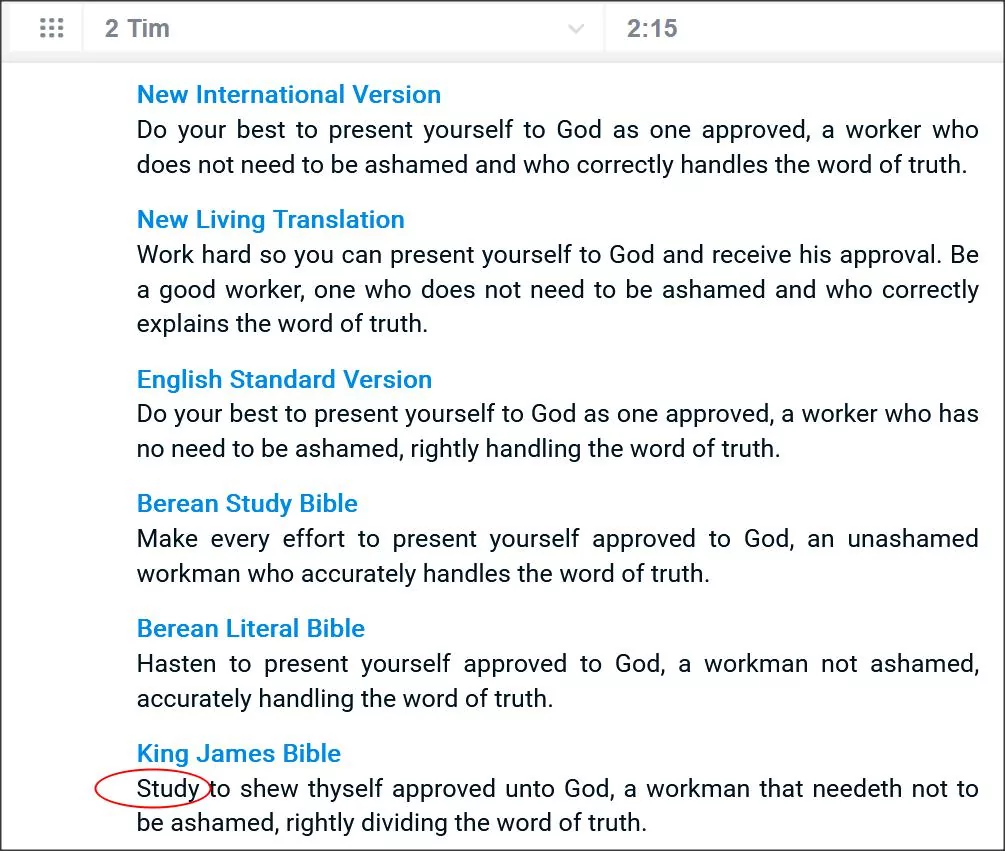
Notice the KJV is really the only major translation that says “STUDY” as the first word in the verse. Interestingly, the other translations instead convey a message of being DILIGENT in how you present yourself to God, and to remain circumspect in His truth. One term, however; that is consistent in the translations is “the word of truth” at the end. Typically, Believers equate “word of truth” with scripture. Even for those who see the bible changes, a large number still maintain that “logos”, or Greek for “word”, still aptly suites the written word of scripture. For example, how often will you still hear today from bible teachers in our community referring to the bible as “The Word”.
One of the primary lessons though for most in the seeing community, is that “the Word” or “the Word of God” is a title which belongs to Jesus alone. Often the verses cited to support this claim, are John 1:1 and Revelations 19:13. It certainly feels that rediscovering who Jesus is in our lives is one of the primary experiences of waking up to the bible changes for good reason. Afterall, if the written word has proven to be corruptible and changeable, how much more crucial is it to realize “the Living Word”, Jesus, is not? How though do we reconcile the usage of the term “word of truth” in this 2nd Timothy verse? Is the scripture referring to the letter of the text as “the Word of truth” or is it referring to The Living Word of Truth aka, Jesus? The chances are if you are a long-time bible reader, you believe this is a reference to study the bible.

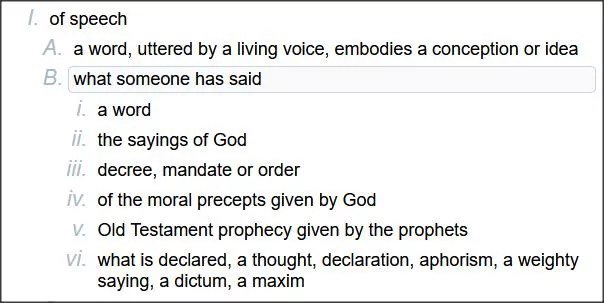

Clearly, with enough humility we can agree that the awakened Church has had to come to terms with some cold hard truths of misunderstanding a good deal of prophecy. For example, many have had to accept that the Mandela Effect and the bible changes do very likely fit the description of the “strong delusion” from 2 Thessalonians 2. In years past, our prophecy teachers had speculated that the strong delusion would come later only when we could literally see a one-man antichrist “hit the scene”. Others have conceded to the idea that abomination of desolation in “the Holy Place” or “topos” in Greek, in the context of Matthew 24 may in fact be the abominable changes in what we thought was the “holy” bible (also translated as “topos”),

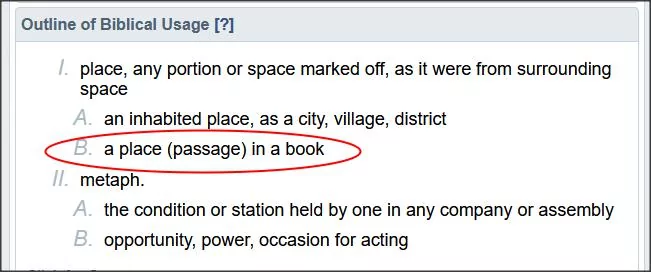
or even the spiritual place (“topos”) where the Holy Spirit resides and which Paul elucidates in 1 Corinthians 14:16. This of course is a departure from what traditional dispensationalist hold to as a reference to a physical location in a third temple constructed in Jerusalem.
"Else when thou shalt bless with the spirit, how shall he that occupieth the ROOM of the unlearned say Amen at thy giving of thanks, seeing he understandeth not what thou sayest?"
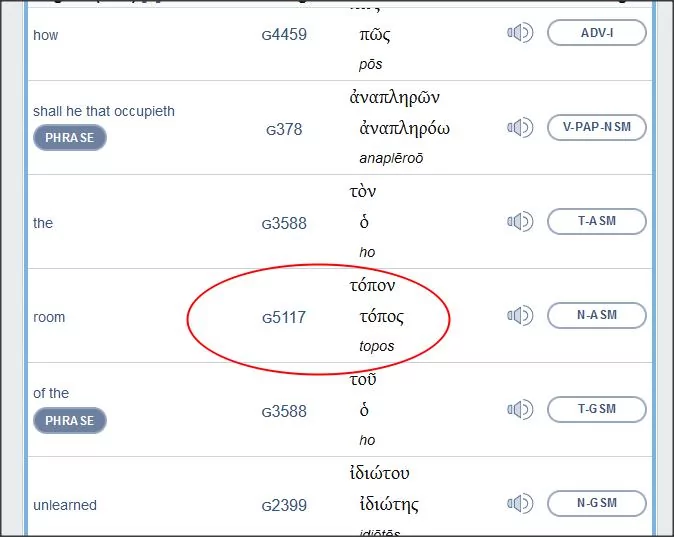
Can we apply this same humility to reconsider what 2 Timothy 2:15 is really talking about? Indeed, if we evaluate the Greek in this verse, there is good reason to re-contextualize the language “correctly handling the word of truth” or as the KJV says “rightly dividing the word of truth” in 2 Timothy 2:15.
What if I told you the passage may not have had anything to do with scripture study ?

What if that part of the verse is more truly understood in terms of how we discern or impart what “the Word of Truth (JESUS)” is telling us instead of how we discern or “divide” scripture properly? This possible distinction may yield an avalanche of clarity for those seeing the bible changes. How else, for example, can we both recognize the supernatural bible changes corrupting much of the “Good Book”, and still be expected to voraciously study them for God’s approval? No matter how much we think the Holy Spirit will discern every corrupted or changed word in the bible for us, these concepts work against one another, and we know God is not an author of confusion. However, if we take an honest look at the Greek text look at what we find:
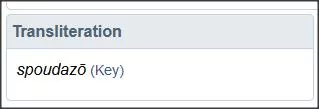
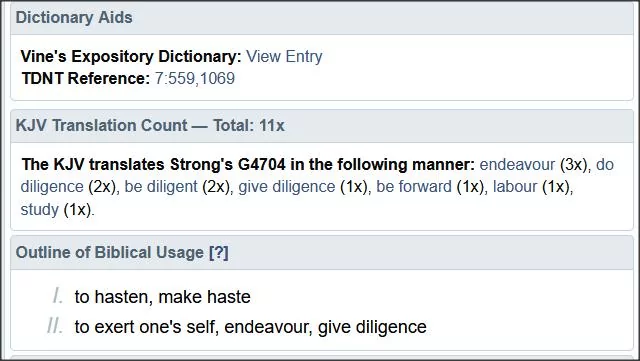
So while "study" is just one way the word is used, more of the usages of these words could arrive at an interpretation that conveys an idea more like this:
“Be diligent to live as someone devoted to Christ, having no cause for shame as your life is tried and tested when you walk on the straight and narrow by faith”.
An entirely different understanding than:
“Be sure to study the bible rigorously, so that God is not ashamed of you as you try to correctly contextualize and discern the letter of the bible”.
Consider though, that The Word of God, is Jesus, and Jesus is also the TRUTH, so Jesus is simultaneously “the Word of Truth”. We hear and accept His Word as Truth when we walk by faith. However, we must be diligent in our faith walk. Diligence requires applying what we know from Jesus’ Gospel, and by the Holy Spirit’s leadership in our lives to our thoughts and actions. When we apply diligence to our faith walk, we are consistent, we are non-hypocritical, in short, we “walk the talk and talk the walk”. When we live like this, we have nothing to be ashamed of, because there is no condemnation in Christ Jesus! The confusion, the contradiction, the questions about 2 Timothy 2:15 within the context of the bible change experience now begin to fade away! How does the passage really make sense in the way the KJV presents it and how it is traditionally taught? Do you believe that God’s approval of His children is contingent on how much they study? Shall you be in shame at judgement because you didn’t study enough, or will you be ashamed if you said one thing and did another? Are you expected to be “workman” held to your abilities and prowess of your study so that God approves you? Is God going to send you to hell because you misunderstood the role of scripture in 2 Timothy 2:15, or didn't understand what "nephilim" or "fallen angels" really are? We know the answer to these questions and they contradict every fiber of salvation by faith in Jesus because of God’s grace.
Yet the community will remain divided on this issue as far as the eyes can see. There is a pervasive culture in the Christian community whether they see or not, that we are to respect the expertise of bible experts. The experts embrace this mantel in the same way professionals embrace their skill sets of whatever trade they had formal training in. The longer you studied, the more authority you have in matters of biblical truth is what we tend to default toward. It is amazing that people in the bible changes community believe this even though a significant number of members in the community recall changes from 40 years or more. For others, old habits will not be broken. People of habbit retreat to the “quiet place” to study and seek God and they will not be disuaded even when they know satan has fundamentally corrupted the truth in much if not all of scripture. Most will rationalize this by telling themselves “the primary meaning is still there”, and they trust the Holy Spirit to help them pick through the rotting corpse of scripture to find morsels of truth.
We know God can use anything to bring the lost to Him, even a heavily corrupted bible, but the question here is directed at the long-time readers and believers who see the changes. The question here and the elephant in the room is whether or not we think God really expects the long time believers and scripture readers to seek Him in the corrupted verses? For the veteran readers and “bible teachers”, does God have this expectation of us? Verses like 2 Timothy 2:15 seem to lead a large contingent of us to answer this in the affirmative. Also, the idea that because Jesus quoted them, we must be compelled to seek God in them seems to be a driving factor as well. However, we fail to realize that Jesus quoted untampered words from a perfect memory, not to mention He was setting an example for an era where the scriptures would be more pure. Regardless of the corruptions in the bible, many still feel compelled to believe we must still study the bible to find God and the Spiritual strength we crave even if every single page has corruptions in it. The chances are, an article like this won’t convince you otherwise if you have made up your mind in this matter, but the request here is to just think through what is being said here.
Brethren, the cunning serpent is most likely at work here and his schemes are ever so subtle as they were in the garden. Now his schemes in much of the changed scriptures are wreaking devastating havoc on our Spiritual understanding. Never in Christian history has there been so much confusion over the names of Jesus, or God the Father; never has there been so much hatred by Believers of Paul and his writings; never has there been so much confusion about what the “Sabbath” is, or what the relevance of bloodlines are to our salvation. Have you not considered that just maybe satan’s hand is in all of this as we are discovering more and more conflicting doctrines in scripture every day? Have you considered that maybe one of his sneakiest tricks is to convince us the bible is still “The Word of God” even though we know it has CHANGED! Have you considered that maybe it is satan and NOT God who wants you devoted to scriptural study so that you slowly re-write your spiritual memory/DNA? These are hard questions to ask, but someone needs to ask them, so please don’t be offended by someone simply raising the question.
If we remain steadfast to Jesus’ Gospel, so much of this confusion melts away. If we allow His grace to lead us as we navigate through and question the ramifications of the bible changes, we may find new wells of understanding that truly draw us closer Him rather than to the confusion points of the letter. Take heed to His calling when He knocks, and allow Him to lift you above the confines of the lying signs and wonders found in the letter.


